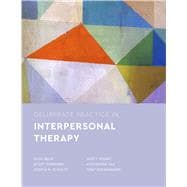
What is included with this book?
Olga Belik, PhD, is chief psychologist and director of training at Child & Family Development Center in Providence Saint John's Health Center. She is also the national trainer and supervisor with the Interpersonal Psychotherapy Institute with a private practice in forensic psychology. She was chair of the California Psychological Association’s Division II: Training and Education in Professional Psychology. She earned an award for Distinguished Contributions to the Education and Training of Child and Adolescent Mental Health Psychologists from the American Psychological Association’s Board of Educational Affairs.
Scott Fairhurst, PhD, is the vice president of Outcomes, Training, and Special Projects at Pacific Clinics, a community mental health center in Southern California. As a clinician and program director for over 25 years, his work primarily focuses on children and adolescents with explosive behavior. Dr. Fairhurst has worked with clients in hospitals, residential treatment, and clinics. He promotes value-based care and democratizing clinical data so that clients, executives, clinicians, and supervisors can measure and manage what they consider to be important. He also offers training in de-escalation of suicidal thoughts and behaviors and conflict resolution.
Jessica M. Schultz, PhD, is associate dean of enrichment and associate professor of psychology at Augustana College. She teaches courses such as child psychopathology, abnormal psychology, and childhood in the developing world. Dr. Schultz’s research focuses on posttraumatic growth; the processes by which people forgive others; and the effectiveness of training programs for empirically supported psychological treatments, including interpersonal psychotherapy. She is also cochair of the Faculty at Four-Year Colleges Special Interest Group and vice president of the River Bend Psychological Association.
Scott Stuart, MD, is emeritus professor of psychiatry and psychology in the Departments of Psychiatry, Psychology, Pediatrics and Obstetrics and Gynecology at the University of Iowa. He is also director of the Interpersonal Psychotherapy Institute, an international training organization, and an adjunct professor at the University of Southern California Keck School of Medicine in Los Angeles. He has received several teaching awards, including the John Clancy Teacher of the Year Award from the University of Iowa. Dr. Stuart is also the author of the Interpersonal Psychotherapy: A Clinician’s Guide.
Alexandre Vaz, PhD, is director of training at the Sentio Marriage and Family Therapy graduate program and Sentio Counseling Center. He has authored many books on deliberate practice and psychotherapy training and is coeditor of the book series The Essentials of Deliberate Practice (APA Books). Dr. Vaz has held multiple committee roles for the Society for the Exploration of Psychotherapy Integration (SEPI) and the Society for Psychotherapy Research (SPR). He is founder and host of “Psychotherapy Expert Talks,” an acclaimed interview series with distinguished psychotherapists and researchers.
Tony Rousmaniere, PsyD, is program director of the Sentio Marriage and Family Therapy graduate program, and executive director of the Sentio Counseling Center. He has authored many books on deliberate practice and psychotherapy training and is coeditor of the book series The Essentials of Deliberate Practice(APA Books). In 2017, Dr. Rousmaniere published the widely cited article in The Atlantic Monthly, “What Your Therapist Doesn’t Know.” Dr. Rousmaniere supports the open-data movement and publishes clinical outcome data at drtonyr.com. He is president of Division 29 of APA.
Series Preface
Tony Rousmaniere and Alexandre Vaz
Acknowledgments
Part I. Overview and Instructions
Chapter 1. Introduction and Overview of Deliberate Practice and Interpersonal Psychotherapy
Chapter 2. Instructions for the Interpersonal Psychotherapy Deliberate Practice Exercises
Part II. Deliberate Practice Exercises for Interpersonal Psychotherapy Skills
Exercises for Beginner Interpersonal Psychotherapy Skills
Exercise 1. Presenting the Interpersonal Inventory: Interpersonal Inventory I
Exercise 2. Exploring Interpersonal Relationships: Interpersonal Inventory II
Exercise 3. Clarifications
Exercises for Intermediate Interpersonal Psychotherapy Skills
Exercise 4. Interpersonal Framing of Distress
Exercise 5. Helping the Client to Describe Their Distress and Need for Support
Exercise 6. Reinforcement of Effective Communication
Exercises for Advanced Interpersonal Psychotherapy Skills
Exercise 7. Communication Analysis
Exercise 8. Generating Communication Options
Exercise 9. Mobilizing Social Support
Exercise 10. Motivating Interpersonal Action
Comprehensive Exercises
Exercise 11. Annotated Interpersonal Psychotherapy Practice Session Transcript
Exercise 12. Mock Interpersonal Psychotherapy Sessions
Part III. Strategies for Enhancing the Deliberate Practice Exercises
Chapter 3. How to Get the Most Out of Deliberate Practice: Additional Guidance for Trainers and Trainees
Appendix A. Difficulty Assessments and Adjustments
Appendix B. Deliberate Practice Diary Form
Appendix C. Additional Approaches and Troubleshooting for the Interpersonal Inventory
Appendix D. Sample Interpersonal Psychotherapy Syllabus With Embedded Deliberate Practice Exercises
References
Index
About the Authors
The New copy of this book will include any supplemental materials advertised. Please check the title of the book to determine if it should include any access cards, study guides, lab manuals, CDs, etc.
The Used, Rental and eBook copies of this book are not guaranteed to include any supplemental materials. Typically, only the book itself is included. This is true even if the title states it includes any access cards, study guides, lab manuals, CDs, etc.